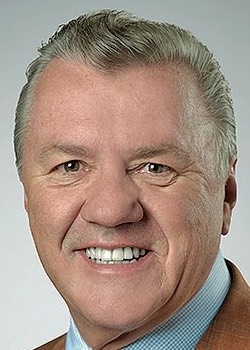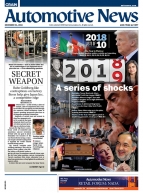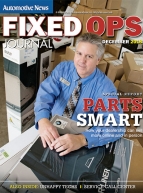At age 70, Manfred Gingl could be off enjoying his retirement after a high-flying 50-plus-year career in the auto business.
Magna vet plans to transform IAC

Gingl is about to shake up International Automotive Components, an interior parts company with 50 factories around the world and 2018 sales of about $4 billion. In the coming days, Gingl, who was named CEO last summer, is expected to announce an overhaul of IAC intended to set it on a new path.
It's not a corporate restructuring, he clarifies. It's more of a "step one" in a plan to change the way IAC thinks, getting it ready for bigger changes in the years ahead.
This long-range thinking comes from a man who has been making business strategy since Lyndon Johnson was in the White House.
"Maybe I don't have the youth, but I still have the strength to build another company," Gingl told Automotive News.
The plan is this: He wants to convert IAC's culture from a corporate mentality to an entrepreneurial one. Starting immediately, he says, IAC's factories will loosely operate as independent businesses.
Local management teams will establish profit goals. They will make decisions about their own costs, make themselves competitive as standalone enterprises and structure themselves however they see fit. They will even, Gingl says, have the authority to pursue new business when an opportunity presents itself.
"This company is going to refocus on where the action is — and that's at the factories," he said. "If your management teams don't feel like they have the power and authority to make improvements, then you've got a problem.
"We want the factories to earn money; otherwise, you're not going to be in business."
If the idea sounds a little familiar, it's because it is precisely the business approach Magna used to become a global industry giant. Magna, where Gingl served as vice chairman under his longtime colleague, company founder Frank Stronach, is made up of multiple business groups. Magna stamps steel, produces electronics, manufactures complete vehicles for automakers, makes seats, builds body structures and supplies powertrain systems. Each operation competes as an independent business under the Magna corporate umbrella.
"I learned a lot in my years at Magna," Gingl acknowledged. "One thing I learned was that you can't just stand still as a maker of a commodity product. You have to offer the customer something more — more technology, entire systems or some innovation. That's where we're going to go with IAC."
IAC intends to develop new products in infotainment, sensors and electronics, engineering new technology into its interior panels and instrument clusters, the CEO reveals.
"But first," he said, "we're going to bring the company to a very decent level of profitability, and that hasn't happened here for the past 10 years."
IAC, headquartered in Luxembourg, employs about 22,000 people in 19 countries, making interior door panels, instrument panels, headliners and consoles. The company is an amalgam of the former interiors operations of Lear Corp. and Collins & Aikman, brought together and managed by the finance company once run by U.S. Commerce Secretary Wilbur Ross. WL Ross & Co., a division of Invesco, and Franklin Mutual Advisers are the closely held company's majority shareholders.
After a rocky year in which the company couldn't find a buyer, sales have tumbled from $6 billion in 2016 to about $4 billion last year.
Gingl said the company will trim its roster of 50 plants to about 45 as it homes in on more profitable business. "I'd rather have $4 billion that's healthy than $6 billion that's losing money," he said.
But getting there means lighting the entrepreneurial fire of IAC's factory managers. This year, IAC will establish a new performance reward system. Individual plants will have direct say on business quoting. The company will invest to strengthen local tooling capabilities and give plants more process engineering resources and more enhanced manufacturing automation.
"We want to create entrepreneurs at the individual companies," Gingl says. "We want them to say, 'I own this plant.' "
Gingl arrived in Canada as an Austrian immigrant at age 18 and went to work at a local tool and die shop owned by Stronach, a fellow Austrian who had immigrated a decade before. That venture would morph into Magna International Inc., which is projected to top $40 billion in 2018 sales. Stronach, now 86, retired in 2011.
Gingl and Stronach worked closely for years, with Gingl eventually becoming vice chairman of the mega-supplier. But it was early in their working life, when the small business was little more than a stamping supplier, that Gingl pressed Stronach to consider diversifying into other fields.
"At one point, we were just supplying chrome trim," Gingl recalls of Magna in the 1960s. "We had only two plants. We didn't even have any engineers. I told Frank, 'I really love American cars with all their chrome. But things could change someday. We need to get into plastics.'
"It's happening again," he says of the current auto industry. "The way people drive is changing, the amount of time they spend in their vehicle and the whole issue of mobility — IAC has to change, too.
"But first we have to get the company ready for it."
Send us a letter
Have an opinion about this story? Click here to submit a Letter to the Editor, and we may publish it in print.

